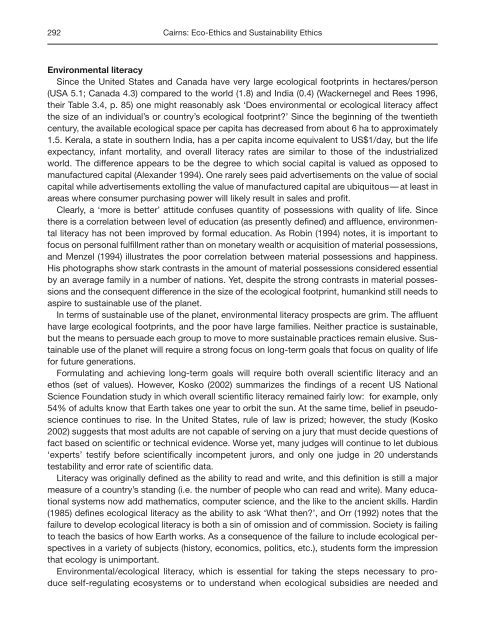View - ResearchGate
View - ResearchGate
View - ResearchGate
You also want an ePaper? Increase the reach of your titles
YUMPU automatically turns print PDFs into web optimized ePapers that Google loves.
292Cairns: Eco-Ethics and Sustainability EthicsEnvironmental literacySince the United States and Canada have very large ecological footprints in hectares/person(USA 5.1; Canada 4.3) compared to the world (1.8) and India (0.4) (Wackernegel and Rees 1996,their Table 3.4, p. 85) one might reasonably ask ‘Does environmental or ecological literacy affectthe size of an individual’s or country’s ecological footprint?’ Since the beginning of the twentiethcentury, the available ecological space per capita has decreased from about 6 ha to approximately1.5. Kerala, a state in southern India, has a per capita income equivalent to US$1/day, but the lifeexpectancy, infant mortality, and overall literacy rates are similar to those of the industrializedworld. The difference appears to be the degree to which social capital is valued as opposed tomanufactured capital (Alexander 1994). One rarely sees paid advertisements on the value of socialcapital while advertisements extolling the value of manufactured capital are ubiquitous— at least inareas where consumer purchasing power will likely result in sales and profit.Clearly, a ‘more is better’ attitude confuses quantity of possessions with quality of life. Sincethere is a correlation between level of education (as presently defined) and affluence, environmentalliteracy has not been improved by formal education. As Robin (1994) notes, it is important tofocus on personal fulfillment rather than on monetary wealth or acquisition of material possessions,and Menzel (1994) illustrates the poor correlation between material possessions and happiness.His photographs show stark contrasts in the amount of material possessions considered essentialby an average family in a number of nations. Yet, despite the strong contrasts in material possessionsand the consequent difference in the size of the ecological footprint, humankind still needs toaspire to sustainable use of the planet.In terms of sustainable use of the planet, environmental literacy prospects are grim. The affluenthave large ecological footprints, and the poor have large families. Neither practice is sustainable,but the means to persuade each group to move to more sustainable practices remain elusive. Sustainableuse of the planet will require a strong focus on long-term goals that focus on quality of lifefor future generations.Formulating and achieving long-term goals will require both overall scientific literacy and anethos (set of values). However, Kosko (2002) summarizes the findings of a recent US NationalScience Foundation study in which overall scientific literacy remained fairly low: for example, only54% of adults know that Earth takes one year to orbit the sun. At the same time, belief in pseudosciencecontinues to rise. In the United States, rule of law is prized; however, the study (Kosko2002) suggests that most adults are not capable of serving on a jury that must decide questions offact based on scientific or technical evidence. Worse yet, many judges will continue to let dubious‘experts’ testify before scientifically incompetent jurors, and only one judge in 20 understandstestability and error rate of scientific data.Literacy was originally defined as the ability to read and write, and this definition is still a majormeasure of a country’s standing (i.e. the number of people who can read and write). Many educationalsystems now add mathematics, computer science, and the like to the ancient skills. Hardin(1985) defines ecological literacy as the ability to ask ‘What then?’, and Orr (1992) notes that thefailure to develop ecological literacy is both a sin of omission and of commission. Society is failingto teach the basics of how Earth works. As a consequence of the failure to include ecological perspectivesin a variety of subjects (history, economics, politics, etc.), students form the impressionthat ecology is unimportant.Environmental/ecological literacy, which is essential for taking the steps necessary to produceself-regulating ecosystems or to understand when ecological subsidies are needed and















